From 1 October 2025, a nationwide bail system started
On 1 October 2025, a deposit system became operational in Poland. This means that when buying a beverage in a package covered by the system, you will pay a deposit, which you will be able to reclaim by returning the empty package to one of the designated collection points.
You don't have to interpret anything - be prepared for a bail system
The deposit system changes the rules of the game - literally! From now on, empty PET bottles, aluminium cans and reusable glass bottles have a specific value expressed in money. The deposit, as it is referred to, always comes back, but under certain conditions. Find out about the rules of the deposit system and check out how #ExitNaZero!

Take the quiz and find out what you know (and don't know) about the Polish bail system!

What is a bail system?
The bail system is a mechanism whereby the vendor of prepackaged beverages charges the customer an additional fee (deposit) for each bottle or can sold. The deposit collected can be reclaimed by the customer by returning the empty packaging to a collection point.
The packaging collected under the deposit system is sent for recycling or reuse (refilling), which extends the life cycle of packaging and closes the raw material cycle.
How does the bail system work?
Polish bail system includes selected types of beverage packaging marked with a special logo. When purchasing a beverage in a package bearing the bail system label the vendor or vending machine takes a deposit from the customer of between PLN 0.50 and PLN 1, depending on the type of packaging. Information on the amount of the deposit for a particular pack is shown on the label. Deposited the deposit can be collected upon return of the packaging at a collection point of your choice. The returned packaging must be empty, uncrushed and marked with the special logo of the deposit system. Otherwise it will not be possible to recover the deposit.
IMPORTANT: There must be at least one return point for packaging and packaging waste in each municipality!
The costs of the deposit system are covered by the beverage manufacturers. For the consumer, the system is cost-free - when the container is returned, the deposit is also returned, so each of us #ExitsNaZero.
Do you sell packaged drinks?
We offer expert advice to companies participating in the deposit system. We provide a comprehensive service for, among other things, the collection and logistics of packaging and packaging waste.
The marking indicating that the packaging is covered by a deposit system consists of a graphic symbol, the words CAUTION and information on the amount of the deposit. The labelling is placed on the label (in the case of bottles) or on the imprint (in the case of cans).
All packages belonging to the deposit system are identified by a clearly visible and legible logo. No deposit will be charged or refunded for packaging not marked as such.
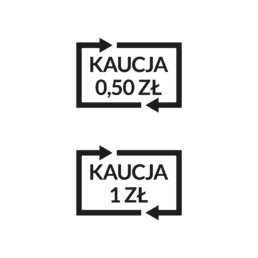
What packaging is NOT covered by the deposit?
- dairy product packaging (e.g. milk bottles, kefir bottles),
- packaging for products other than beverages (e.g. canned vegetables),
- disposable glass bottles, including the smallest glass bottles of spirits (so-called "monkey bottles").

IMPORTANCE: During the first months of the deposit system, both drinks of the same brand will be available in the shops in packages with and without the deposit logo (until stocks run out, but no longer than the end of this year). You will only pay and collect the deposit for the packages with the logo!
Where can bottles and cans be returned?
Packaging covered by the deposit system may be returned in any shop over 200 m2. Large shops are obliged to operate collection points where they collect empty packaging and return the deposit paid to customers.
Glass, plastic or can bottles can also be returned in selected shops smaller than 200m2. Small shops and other establishments selling beverages in packaging can voluntarily set up a collection point where they will accept selected or all types of deposit packaging. Importantly, however, if they have beverages on offer in reusable glass containers covered by the deposit scheme, they are obliged to collect them.
They are obliged to accept
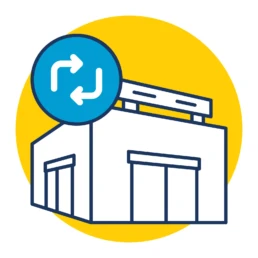
- Shops > 200 m2,
- shops with an area < 200 m2if they offer beverages in reusable glass packaging covered by the deposit system (glass packaging only).
They are not obliged to accept
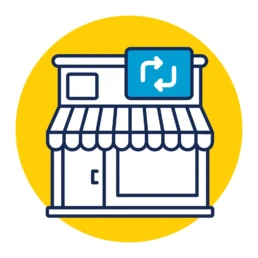
- shops with an area < 200 m2,
- kiosks,
- small catering establishments/foodtrucks,
- other premises selling beverages that are not shops, such as fitness clubs or cinemas.
How do I return the packaging and collect the deposit?
The deposit can be collected upon return of the package at any collection point on the territory of Poland covered by the deposit system. It does not matter whether it is a bottle dispenser (vending machine) or a hand collection point (operated by an employee). In each of them, the terms and conditions of return are the same.
Return at the bottle machine
1.
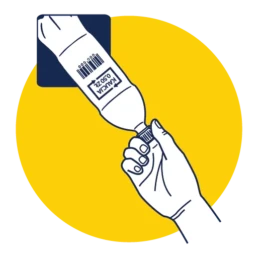
Insert the packs into the opening of the bottle machine.
2.
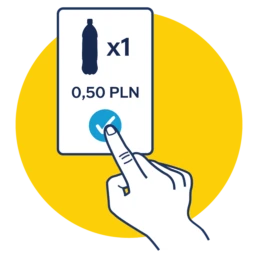
Receive a printout entitling you to a refund of your deposit.
3.
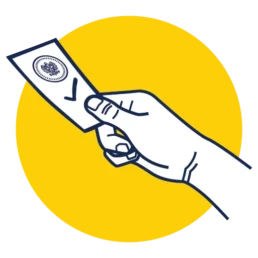
Go with the printout to the cashier or customer service desk to collect the cash.
Return at a traditional point
1.
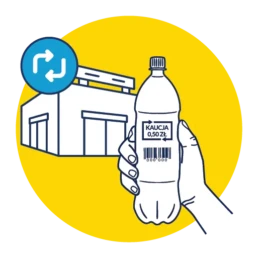
Hand over the returned packaging to the point employee.
2.
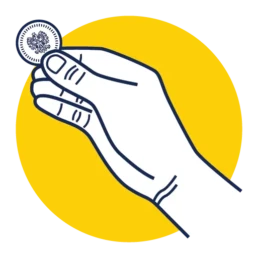
Collect cash or a printout entitling you to a cash refund.
Returned the packaging must be emptied, not crumpled and labelled with a deposit mark. Returning bottles without caps is acceptable but not recommended - the cap is an integral part of the packaging and should therefore be recycled with it.
NOTES: For the return of the deposit no receipt necessary.

When is bail collected and when is bail refunded? The circulation of bail in the bail system
In the Polish deposit system, the deposit follows the packaging. This means that is collected at each stage of distribution and from both retail customers and companies (e.g. wholesalers, shopkeepers). The retailer is responsible for charging and collecting the deposit.
The customer receives return of the deposit when returning the empty packaging to a collection point - In this way, each participant in the distribution chain #OutcomesNaZero. The deposit not collected by the customer is passed on to the bail system operator (the so-called representative entity) and used to cover the costs of operation and development of the system.
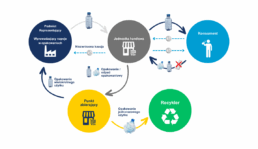
The most common questions about the bail system in Poland
Questions concerning the deposit
The deposit shall be paid at checkout. It is not included in the price of the drink, but is listed as a separate item on the receipt.
The amount of the deposit in the Polish deposit system depends on the type of packaging:
- disposable plastic drinks bottles up to 3 litres - £0.50,
- metal beverage cans up to 1 litre - PLN 0.50,
- reusable glass bottles up to 1.5 litres - £1.
No. Refund of the deposit is possible in cash only. It is also prohibited to return the deposit for packages covered by the deposit scheme in the form of a voucher, gift card, funds on a prepaid card, etc.
Not. The vendor shall transfer the entire collected deposit to the deposit system operatorso there is always #WaitNaZero. If this retailer also operates a return point for empty packaging, it receives funds from the operator to pay the deposit to customers returning the packaging. Only the deposit not collected by the customer is earned. However, this belongs to the system operator and not to the shop and must be used to cover the costs of operating the system.
Questions on packaging
The deposit is collected for all beverage packaging labelled with the bail system logo. These include:
- PET bottles for beverages up to 3 litres,
- metal cans for beverages up to 1 litre,
- reusable glass bottles up to 1.5 litres.
No. The Polish deposit system is a so-called 'receiptless system' - packaging can be returned at any collection point and without the need to present a receipt.
They should be disposed of in the appropriate segregated waste bin - PET bottles and metal cans in the yellow bin and glass bottles in the green bin.
Without the cap yes (although this is not recommended), without the label no. This is because the label carries a marking without which it is impossible to determine whether the packaging in question belongs to the deposit system.
Not. Packaging offered prior to the launch of the deposit system is not specially labelled and therefore not eligible for a deposit refund. There is therefore no justification for collecting unlabelled bottles and cans beforehand in the hope of gaining a return of the deposit.
Not. Milk and milk product packaging is not covered by the Polish deposit system.
Not. Empty packs can be returned in all shops with a surface area of more than 200 m2 and only in selected retail outlets of less than 200 m2. Small shops, catering establishments etc. are not obliged to accept empty packaging and return the deposit, with the exception of reusable glass packaging, as long as they offer drinks in such packaging.
Not. Packaging covered by a deposit system can be returned at any collection point throughout Poland.
Any number of. There are no minimum or maximum quantity limits for returned packages.
Not. At the points of return only packages are accepted emptied, clean and with an undamaged label bearing the deposit symbol.
NOTE: Bottle machines only accept uncrushed packaging.
Not. Empty packaging included in the deposit system can be returned at any time.
This rather than a different catalogue of packaging covered by the deposit system is mainly due to environmental reasons. Studies, including those carried out by Interzero, have shown that plastic bottles are among the most common waste discarded into the environment. Moreover, PET bottles, aluminium cans and glass beverage bottles are among the 8 types of waste that Poles see scattered in streets, parks and other public areas every day[1]. Economic (aluminium is a valuable raw material) and regulatory (to provide a legal framework for long-established bail systems organised by breweries) considerations also motivated their inclusion in the bail system.
[1] 'Waiting for bail' - what Poles know about the bail system... and what they don't know, https://interzero.pl/blog/co-polacy-wiedza-o-kaucji/
Disposable packs: PET bottles and metal cans are counted (either at a bottle machine or at a conversion centre). They are then cut or crushed to facilitate the transport of the waste to a recycling plant, where they are melted down and used for new packaging. Glass bottles Instead, the reusable items are transported to production facilities where they are washed, disinfected and refilled.
When returning packages, does it matter who is the operator of the bail system at the point of sale?
Not. In the Polish bail system the packaging can be returned to any collection point of your choiceregardless of the operator with which the point operates.
Other questions on the bail system
Crates are transport packaging that are not covered by the deposit system. It is up to each retailer to determine the rules for lending them out, so this possibility is requested ask at the specific point of sale.
The need for a bail system in Poland emerged following the entry into force of the SUP Directive (English. Single-use plastics, Directive (EU) 2019/904 of the European Parliament and of the Council of 5 June 2019 on the reduction of the environmental impact of certain plastic products), which committed all EU Member States to achieving high levels of (77% from 2025 and 90% from 2029). separate collection single-use plastic beverage bottles of up to 3 litres. As the experience of other countries shows, it is not possible to achieve such high targets without the introduction of a bail system.
Find out more about the collection targets under the bail system >>
The main benefits of introducing a bail system in Poland are:
- reducing environmental litter,
- achieving the minimum collection rates for plastic bottles required by EU legislation,
- increasing recycling rates plastics and aluminium,
- reducing the use of primary raw materials,
- more efficient closure of packaging (reusable glass bottles) and raw materials (plastics and aluminium),
- consolidating good habits in terms of waste segregation.
With the bail system the amount of waste disposed of in the environment will be reduced - Instead of going to nature, packaging and packaging waste will either be recycled or reused. Closing the material cycle will also reduce energy consumption - Producing recycled PET (rPET) consumes less energy than producing the same amount of virgin PET from raw materials.





